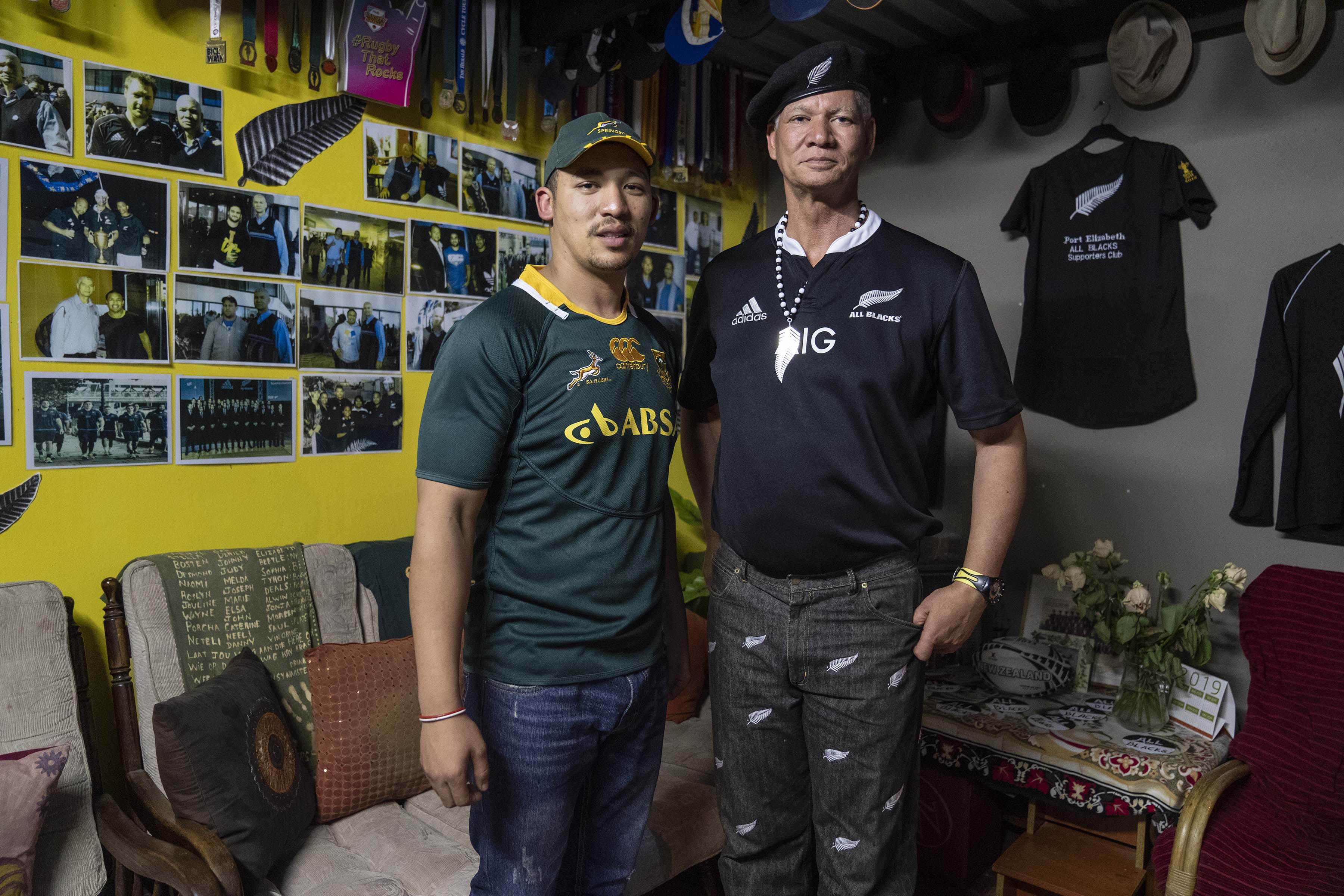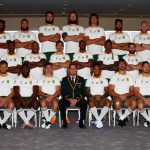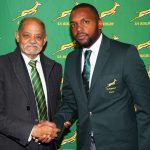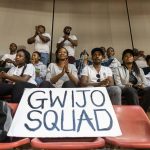SA Rugby’s transformation problem
More than two decades into democracy, the ghosts of apartheid still haunt the Springboks, and a portion of South Africans despise the team and what it stands for.
Author:
28 October 2019

His smile beamed across the forecourt of the Hout Bay petrol station. The gentleman, probably in his 60s and classified as coloured by the apartheid government, pot-bellied and with thinning grey hair, had a reason to be happy.
Along with his grin, he wore an All Blacks jersey from a decade ago with shorts that had seen better days. However, he wore his rugby jersey like it was brand new. The old man chatted joyfully with the petrol attendants about his favourite team.
It was a Saturday afternoon and the All Blacks had just beaten the Springboks 23-13 in the opening game of the Rugby World Cup in Yokohama, and even here in the polarised Western Cape town of Hout Bay his appearance in the “enemy’s” jersey was an aberration. But he seemed emboldened as he pointed to the silver fern emblem on his chest and announced to the attendants, “You see these All Blacks, they supported us blacks.”
Still giddy from the win, he followed that statement with his interpretation of the haka, to comical effect, much to the enjoyment of his audience.
Related article:
It was a casual, light-hearted encounter not uncommon in the Cape. For decades, the All Blacks have enjoyed loyalty from a section of society that still feels betrayed by South Africa’s political revolution of 1994 and how sport was administered in the years that followed. They say real transformation was relegated to the bench in favour of fake unity and outward appearances in 1995, while meaningful social change and service delivery was overlooked and abandoned at the altar before true democracy was realised.
By its own admission, mother body SA Rugby has missed its transformation targets at national and Super Rugby level year after year. Last year it missed its Springbok transformation target of 45% black participation, achieving just 39%. Eleven players of colour were in the original 31-man World Cup squad that Bok coach Rassie Erasmus named, a 35% pass mark.
Disdain for the emblem
Erasmus was quick to point out earlier this year, however, that transformation targets apply to the average number of black players that the Boks field in the 23-man match day team throughout the year. It’s an important caveat, and one that staved off a flood of criticism ahead of the World Cup.
While the obligatory debates around transformation of the Springboks and quotas in rugby have simmered down as the team competes in Japan, there are those making sure politicians and administrators are reminded of their failure to deliver a better life for all – the real reason they look at the Springbok emblem with disdain.
The Springbok was and to some still is a despised symbol of an old, white order that still influences daily South African life today.
In the 1970s, when asked to describe the ruling National Party’s attitude towards international rugby competition, anti-apartheid activist and former president of the South African Council on Sport (Sacos) Norman Middleton said: “I don’t think that the government could care less about such sports as cricket and soccer. They don’t really mean much to the true Afrikaner. Therefore, the expulsion of the country from international competition doesn’t mean too much. But rugby is different. Rugby is the Afrikaner’s second religion.”
Related article:
Mark Fredericks was a fierce supporter of the sporting boycott against South Africa in the 1970s and 1980s. His beliefs were aligned with that of Sacos, that there can be no normal sport in an abnormal society. He hasn’t softened his stance much in recent years.
“I can’t even think of a team that I would hold in higher levels of disgust than the Springboks,” says Fredericks.
The activist speaks with a passion for sport and the game of rugby in particular. He bore witness to the decay of community sport starved of resources, and generations of sportsmen and women who were denied their sporting dreams because of apartheid. With unification in 1994, Sacos affiliates gravitated towards former president Nelson Mandela’s dream of sport as a unifier.
Transforming the system
But community structures were left rudderless while waiting for help to arrive from newly formed sports bodies and administrations. Executive appointments were politicised and development became stagnant. It was a betrayal that continues to have an impact to this day, according to Fredericks.
“What we had was an alarming collapse of not only clubs, but the social cohesion that existed around those clubs, not only in rugby, but also the communities. The aunties that used to make and sell koeksisters around the local derbies, all of that has disappeared. And we’re looking now at a country where the recent crime statistics show that 70 000 contact crimes against women have been committed in the past year.”
When Fredericks talks about transformation, it has little to do with how many black players were on the plane to Japan in September, but rather how the system that favours elite athletes is being transformed to ensure that all athletes are given the same opportunities to succeed no matter where they come from.
Related article:
“The common answer used when we ask, ‘Why was sport sacrificed for the new dispensation?’, was ‘But we did it to avoid a bloodbath’. But between 1994 and 2018, more than 500 000 South Africans have been murdered. Basically, I’m asking the question, ‘Is it possible that the anti-apartheid sport model served our post-apartheid social cohesion better than the elite system we have now?’”
Fredericks, a video technician at Walter Sisulu University, produced a study that asks those difficult questions of the current administrators and decision makers.
“In 2005 my wife inspired me, because I was actually trying to tell the story of my rugby club, Universal in Kimberley. I just wanted to do a tribute to them, but I used very small cameras, and as we were watching these videos one night my wife said to me, ‘Why don’t you rather make a documentary?’” Fredericks says.
All Black supporters
Fredericks is reluctant to call his work a documentary just yet. What it is, is a series of questions and observations from those who suffered and lost hope all those years ago.
“Traditionally, I always supported the All Blacks. But in 1994, my rugby club hosted the New Zealand Maoris in Kimberley with Zinzan Brooke and those guys. They did the haka for us. We were sitting around like rugby peers in the Kimberley Hotel and one of the guys said to us they did not realise they had such support in South Africa, but they really feel that we should get behind our national team now because next year is a World Cup year,” Fredericks says.
“I decided then that I would support the Springboks, but I always had an uneasy feeling. When Andre Markgraaff was appointed, my unease became a real irritation. And when Rudolf Straeuli was in charge, by then I reverted to my pre-1994 days of supporting the All Blacks. I tried to look at the good in them. I had nothing against the players, but the system is a flawed system.”

New Zealand had a front-row seat to the inner turmoil South African rugby experienced at the hands of apartheid’s progenitors. It began in 1965, when then prime minister Hendrik Verwoerd ruled that future tours by New Zealand could no longer include Maoris.
There was a belief among apartheid leaders that allowing Maori All Blacks into South Africa would lead to them fraternising with Afrikaner girls. The move sparked the gradual isolation of South Africa through sport, until full-blown sanctions in the 1970s and 1980s. New Zealand was the scene of pitch invasions on the Springboks’ 1981 tour and it was against New Zealand in 1992 in Johannesburg that the sporting isolation was ended.
But the promised transformation that was to come with unification didn’t materialise. Instead, what followed was adherence to the status quo with superficial changes that, according to critics such as Fredericks, fooled most of the people all the time.
Related article:
“It depends on our definition of transformation. If transformation means that we are changing the system and that we plucked [Springbok captain] Siya Kolisi out of his school in Zwide, and he was able to compete equally against guys from Grey High School, then it means progress. But what happened is they took Kolisi out of his school [in Zwide], gave him a scholarship to go to Grey High School, and they transformed him over there. They haven’t transformed the system; it’s the same system. It’s not transformation, it’s assimilation. So Kolisi becomes the face of a system that is designed against black people,” says Fredericks.
SA Rugby’s Transformation Plan 2015-2019 hoped to achieve far more than it did. All Super Rugby franchises failed to meet their targets of 45%. The rugby body admitted in its annual report that “the reality is that the gap is so large that it is simply impossible for it to be closed by most of the provinces”.
Now, SA Rugby’s slightly reimagined Strategic Transformation Development Plan 2030 will be regulated by an initial agreement between SA Rugby and the provinces, an incentive policy and penalty measures for non-compliance. The plan will focus on access to the game, skills, demographics, community development and social responsibility.
It may not be enough to convince people like Fredericks, or the old men in the Cape who support the All Blacks, to change their allegiances, but it may provide better meaning to transformation for the communities that need it the most.




